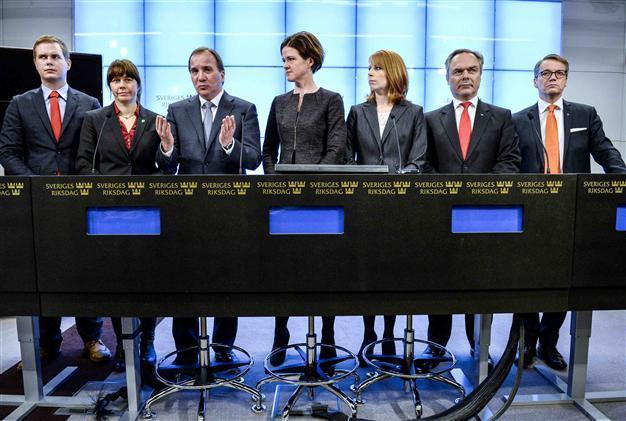Sweden can't avoid immigration debate: analysts
STOCKHOLM - Agence France-Presse

Sweden's mainstream parties reached a deal on Saturday that will allow the minority centre-left government to remain in office and sideline the anti-immigration Sweden Democrats, who hold the balance of power in parliament. REUTERS Photo
Sweden may have narrowly avoided snap elections that would have been dominated by a debate on immigration, but with asylum seekers arriving in record numbers the issue is unlikely to stay off the agenda for long, analysts say.
The Sweden Democrats, a far-right party holding the balance of power in parliament, had said they wanted the polls to serve as a "referendum on immigration" -- and they almost succeeded.
"If we had ended up with snap elections, we would have talked a lot about immigration and it would have been on the Sweden Democrats' terms," said Camilla Sandstroem, a political scientist at Umeaa University in northern Sweden.
The Sweden Democrats, who came third in September parliamentary polls, this month pushed Prime Minister Stefan Loefven to call early elections after they refused to back his budget to signal discontent with his generous immigration policies.
But on Saturday, Loefven, a Social Democrat, announced a surprise deal with the centre-right opposition that enables him to stay in the job without seeking a new mandate from voters.
He unveiled a wide-ranging agreement that aims to ensure political stability until 2022 by allowing the traditional parties to govern without asking for support from the Sweden Democrats.
But one word was absent from the accord: immigration.
"It's a bit surprising that the immigration issue is not part of the deal," said Sandstroem. "We urgently need to discuss it."
Sweden, with a population of 9.6 million people, has one of Europe's most liberal immigration policies and is expected to receive up to 105,000 asylum seekers next year, according to official estimates.
This record number is partly due to a sweeping gesture announced last year to grant permanent residency to all Syrian refugees who make it to Sweden.
Most Swedes are proud of the openness and tolerance associated with their country. However, many also insist on the need to discuss the consequences of their immigration laws.
"We have to talk more about immigration and integration. No one talks about it and that gives the protest parties more room because they are willing to address the issue," said Jakob, a 35-year-old IT consultant, who declined to give his last name.
Critics argue politicians like former prime minister Fredrik Reinfeldt, who says Sweden can handle many more immigrants, are out of tune with the reality on the ground.
They say integration has generally been much less successful than claimed by the political establishment and a lack of open debate has made the situation worse.
A series of riots last year by stone-throwing and car-burning youths in several immigrant-heavy neighbourhoods, mainly in the Stockholm area, has added to the controversy.
Elin Wihlborg, a social scientist at Linkoeping University near Stockholm, said a conversation on immigration is bound to happen before the next election, slated for late 2018.
"Most people in Sweden agree that we are an open nation and we want to welcome asylum seekers for a period of time, but the big problem at the moment is how we actually treat people who have arrived here," she said.
She added that Swedish municipalities, who often complain about housing shortages, could end up triggering a public debate on immigration.
"It's very much the responsibility of the local governments to manage asylum seekers, and I think the national government has to take that issue more seriously because the local politicians in the municipalities can't really cope," said Wihlborg.
Anders Widfeldt, an expert on Swedish politics at the University of Aberdeen in Scotland, said Swedes were having the debate already.
"There is talk about unemployment. There is talk about integration. There is talk about crime," he said. "What on Earth is it that is not being debated? It's just that it's being debated on different terms."
What Swedes really want to avoid is a debate that opens up "negative, stereotyping, stigmatising feelings about people that come from other countries and have fled for their lives," he said.
